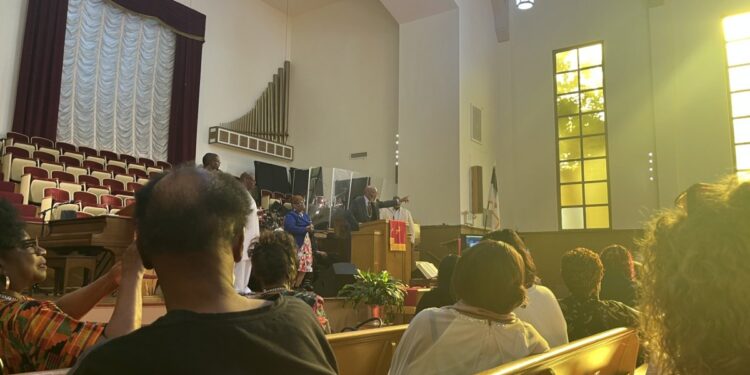In San Francisco on Sunday, more than 100 Black American and Black African leaders gathered at Third Baptist Church to meet the current political and cultural moment. They listened to speeches about politics, community, and faith, and also discussed ways to elevate Black voices during marquee events coming to the Bay Area next year.
Singing, cheering, and prayer echoed through Third Baptist Church on Saturday as the church hosted a Pan African gathering.
San Francisco resident and executive editor of BlackMoney.com, John William Templeton, explained that the church has hosted these gatherings in years past on August 31, as that is the day the UN has designated as International Day for People of African Descent. Templeton said that this is the first year this event has been held in person with such large attendance.
Some of the attendees grew up in the Bay Area or elsewhere in the United States; others grew up in countries including Eritrea, Nigeria, Ghana, or the Democratic Republic of the Congo.
The program on Sunday was led by civil rights activist Reverend Dr. Amos Brown, who recently retired from his role leading Third Baptist. Brown began the event with a conversation rooted in concern for the state of American politics.
“This is not the first time we’ve had these hellish, horrifying, earthshaking moments,” he told the crowd.
Brown introduced Oakland Mayor Barbara Lee, who made a speech that seemed to reference President Trump’s recent insinuations that he could send the National Guard to Cities like Oakland.
“No one in Oakland knows Donald Trump like I do,” Lee said, noting her tenure serving in Congress included the four years of Mr. Trump’s first term as president.
“We’re not going to let Donald Trump turn the clock back; we will continue to march forth until liberty and justice is done,” Lee said.
At the gathering, attendees also talked about how, with the Super Bowl and World Cup games coming to the Bay Area in 2026, they’d like to use the events as a chance to spotlight Black-owned businesses and to connect with the Black visitors who will be in town to attend the events.
“So when the Super Bowl actually gets here, it will give us a chance to broadcast what we actually stand for and give us a chance to knock on the door of the financial world, letting them know that we’re not getting anywhere,” said San Francisco resident Jordan Nickelson-Smith, who noted that there are many local Black-owned businesses that could stand to benefit.
Templeton said he’s involved with a proposal that’s been sent to San Francisco’s Mayor to use the Fillmore Center to promote this concept during one major sporting event.
“We want to turn it into a pavilion for African nations and tourism bureaus to promote themselves in the 60 days leading up to the Super Bowl, and then if it works, we can extend it through the rest of the year,” Templeton said.
Attendees noted these big events could be a chance to collaborate and to highlight Black History in America.
“I really appreciate when we have these moments when we can come together and discuss the important things, like what’s currently happening politically with the climate and everything, and how we can actually do something to make a change,” said Konami Hackett of San Francisco.
Whether they live across the city or across the world from one another, people at the event said they were struck by the similarities in each other’s stories.
Copyright for syndicated content belongs to the linked Source link





